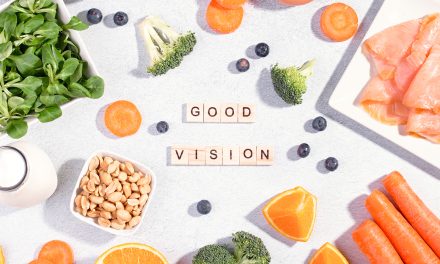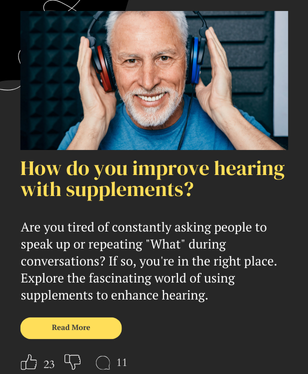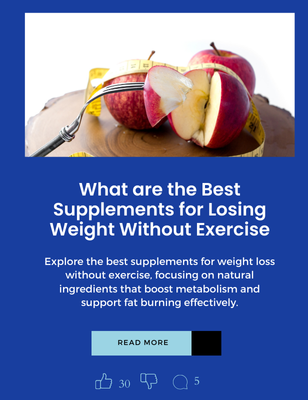Night vision, the ability to see in low-light conditions, is crucial for various activities, such as driving at night or enjoying the natural world after sunset. Improving this ability has garnered the interest of many, leading to discussions on what supplements may enhance visual acuity in the dark. While the human eye is not designed for nocturnal activity, certain nutrients have been shown to support better night vision and overall eye health.
Nutrients such as vitamin A are well-known for their role in maintaining vision, including night vision. Other antioxidants like lutein and zeaxanthin, found in the retina, are also critical for protecting the eyes from harmful light exposure. Some minerals like zinc play a role in the metabolism of vitamin A, facilitating its function in the eye. Additionally, various herbal supplements are being studied for their potential to support eye health, though it’s important to assess their efficacy and safety.
Key Takeaways
- Certain vitamins and minerals can support improved night vision and eye health.
- Antioxidants like lutein and zeaxanthin protect the eyes from light-induced damage.
- Consulting with healthcare professionals is crucial before taking new supplements.
Understanding Night Vision
Night vision is the ability to see in low-light conditions. Human night vision is not as developed as that of some animals, but it can be optimized. The rods in the human eye are responsible for detecting light at low levels and contribute to night vision. In contrast, cones provide color vision and function best in bright light.
Several factors can affect one’s night vision:
- Age: Younger people tend to have better night vision as sensitivity to light can decrease with age.
- Adaptation Time: Eyes take time to adjust from bright to dim light.
- Nutrition: Certain nutrients contribute to healthy vision.
It is essential to maintain overall eye health to support night vision. Here is a list of key nutrients that can play a role in maintaining optimal night vision:
- Vitamin A: Vital for the production of rhodopsin, a pigment that aids night vision.
- Zinc: An important cofactor for vitamin A metabolism in the eye.
- Omega-3 Fatty Acids: Found to help protect adult eyes from macular degeneration and dry eye syndrome.
- Antioxidants (Lutein and Zeaxanthin): These may help protect eyes from harmful light waves.
It is also important to note that certain habits like smoking or prolonged exposure to bright screens can impair night vision. Regular eye check-ups are crucial for ensuring the eyes are in good condition and to get personalized advice from an eye care professional on maintaining or improving night vision.
Key Nutrients for Eye Health
Selected nutrients are crucial for maintaining and potentially improving night vision. The focus here is on those that have been scientifically shown to benefit eye health.
Vitamin A and Beta-Carotene
Vitamin A is essential for the retina’s operation, particularly in low-light conditions and for color vision. Foods rich in Vitamin A or beta-carotene (which the body converts to Vitamin A) include:
- Carrots
- Sweet potatoes
- Dark leafy greens
Zinc
Zinc plays a vital role in transporting Vitamin A from the liver to the retina to produce melanin, which protects the eyes. Good sources of zinc are:
- Oysters
- Beef
- Pumpkin seeds
Vitamin C
Vitamin C contributes to healthy blood vessels in the eyes and may combat the development of cataracts. Citrus fruits, such as oranges and grapefruits, are excellent sources of Vitamin C.
Omega-3 Fatty Acids
These fatty acids are key components of retinal cells and help reduce inflammation. They can be found in high concentrations in:
- Fish oil
- Flaxseeds
- Walnuts
Herbal Supplements for Night Vision
Several herbal supplements are reputed to support and possibly improve night vision. Two of the most commonly discussed are Bilberry and Ginkgo Biloba, both of which have components that have been associated with ocular health benefits.
Bilberry
Bilberry, a relative of the blueberry, contains anthocyanins, which are potent antioxidants. Research suggests that anthocyanins can help improve night vision by aiding in the regeneration of rhodopsin, a protein in the eyes that helps one see in low light conditions. The recommended intake is often cited as 160 to 480 milligrams daily, typically in capsule form.
Ginkgo Biloba
Ginkgo Biloba is another herb that is believed to benefit eye health, specifically by enhancing blood flow to the eyes. Improved circulation may contribute to better night vision. It is rich in flavonoids and terpenoids, known for their strong antioxidant effects. For Ginkgo Biloba, a common dosage is 120 to 240 milligrams per day, standardized to 24% flavone glycosides and 6% terpene lactones.
Antioxidant Support for the Eyes
Antioxidants play a crucial role in maintaining eye health by protecting against oxidative stress, which can impair night vision.
Lutein and Zeaxanthin
These two carotenoids are found in high concentrations within the retina, especially in the macula, which is responsible for central vision. They serve as natural filters of harmful blue light and aid in protecting the eyes from damage. Foods rich in lutein and zeaxanthin include:
- Spinach
- Kale
- Corn
- Egg yolks
- Grapes
For individuals seeking to supplement their intake, studies suggest a daily dose of 10 mg of lutein and 2 mg of zeaxanthin for optimal eye support.
Astaxanthin
Astaxanthin is a potent antioxidant with anti-inflammatory properties. It is found in certain algae and seafood such as salmon and shrimp. Research indicates that astaxanthin may help reduce eye fatigue and improve visual acuity. The recommended supplemental form of astaxanthin for eye health is 4-6 mg daily. It is also essential to choose high-quality supplements to ensure purity and effectiveness.
The Role of Minerals in Eye Health
Minerals play a crucial role in maintaining eye health and function. They are involved in a multitude of biochemical processes that support vision, including the protection and maintenance of eye structures.
Selenium
Selenium is an essential trace mineral with antioxidant properties. It helps protect the ocular tissues from oxidative stress, which can damage cells and lead to vision impairments. Studies suggest that selenium supports the activity of glutathione peroxidase, an enzyme important for the detoxification of the lens of the eye. Adequate selenium intake is associated with a reduced risk of cataracts.
- Recommended Daily Intake: Adults should consume 55 micrograms of selenium per day.
- Food Sources:
- Brazil nuts
- Yellowfin tuna
- Halibut
Magnesium
Magnesium is a vital mineral that plays a role in nerve transmission and the relaxation of muscle tissue within the eyes. It can help in preventing the constriction of blood vessels, thereby ensuring proper blood flow to the eye’s retina. Some research indicates that low levels of magnesium may be associated with specific eye disorders such as glaucoma.
- Recommended Daily Intake: Men require 400-420 milligrams and women need 310-320 milligrams of magnesium daily.
- Food Sources:
- Spinach
- Pumpkin seeds
- Almonds
Supplements for Overall Eye Function
Optimal eye function relies on a blend of specific nutrients. Ensuring adequate intake can support visual acuity and may play a role in night vision improvements.
Taurine
Taurine, an amino acid found in the retina, is essential for retinal cells’ protection and function. Diets insufficent in taurine might lead to vision problems, as it supports the retinal cells’ health.
Flavonoids
Flavonoids are polyphenolic compounds with antioxidant properties. Found in various fruits and vegetables, they aid in protecting the eyes from oxidative stress and may enhance blood flow to ocular tissues, which helps maintain eye health.
Potential Risks and Interactions
When considering supplements for night vision, one must be aware of potential risks and interactions with other medications or health conditions.
- Vitamin A: High doses can be toxic and may cause liver damage or blurred vision. It can also interact negatively with certain cholesterol drugs.
- Zinc: While it aids in vitamin A absorption, excess zinc can disrupt the balance of other essential minerals, like copper.
| Supplement | Risks | Common Interactions |
|---|---|---|
| Vitamin A | Toxicity, liver damage, birth defects in pregnant women | Cholesterol medications, other retinoids |
| Zinc | Immune function impairment, copper deficiency | Antibiotics, penicillamine |
| Omega-3 FAs | Increased bleeding risk, high blood sugar | Blood thinners, high blood pressure medications |
| Bilberry | Mild side effects like digestion issues | Blood thinning medications, diabetes drugs |
| Lutein | Minimal side effects reported | None known, but caution if allergic to marigold |
- Omega-3 Fatty Acids: They may increase bleeding risk especially if one is on blood thinners. Diabetics should monitor their blood sugar as omega-3s can increase glucose levels.
- Bilberry Extract: Generally safe, but may increase the risk of bleeding if taken with blood thinners. It could also affect blood sugar levels, impacting diabetes medications.
- Lutein: Rarely causes side effects. However, individuals with allergies to marigold flowers should exhibit caution, as lutein is often extracted from these.
Before starting any supplement, consulting with a healthcare provider is crucial, particularly if there are pre-existing conditions or other medications involved. They can manage potential interactions and ensure the safe use of supplements.
Enhancing Absorption and Efficacy
Optimal absorption and efficacy of supplements are key to improving night vision. Specific approaches can ensure that the body utilizes these supplements effectively.
Combining Supplements
Certain supplements work best when taken in tandem. For example, vitamin A is essential for night vision and its effectiveness can be enhanced when combined with zinc, which plays a role in the metabolism of vitamin A. A widely recommended pairing is:
- Vitamin A: critical for the maintenance of the retina, particularly the rod cells which are crucial for low-light vision.
- Zinc: helps with the activity of enzymes responsible for eye health and can aid in the absorption of vitamin A.
Lifestyle Factors
Lifestyle choices can significantly influence the absorption and effectiveness of supplements. They should ideally:
- Diet: Consume a balanced diet rich in green leafy vegetables, dairy, and fish to naturally complement supplementation.
- Hydration: Maintain adequate hydration as water is necessary for the transport and absorption of vitamins.
- Avoidance of Inhibitors: Limit substances that can impair absorption, such as excessive alcohol and caffeine.
Consistency in taking supplements at the same time every day might also improve their absorption and overall effectiveness.
Research and Evidence
In evaluating the best supplements to improve night vision, the discussion is grounded on two critical pillars: the findings from clinical trials and the consensus among eye health experts.
Clinical Studies
Clinical research has identified certain supplements with potential benefits for night vision. Vitamin A is pivotal for the maintenance of rhodopsin, a protein in the eyes that allows for seeing in low light. A study published in the Archives of Ophthalmology demonstrates that a deficiency in Vitamin A can lead to night blindness, and supplementation may restore vision to normal levels. Another nutrient, Zeaxanthin, has been shown to increase macular pigment density, which may enhance visual acuity and night vision. The American Journal of Ophthalmology highlighted a randomized controlled trial suggesting improvements in night driving performance amongst individuals with higher macular pigment levels, attributed to Zeaxanthin intake.
- Supplement: Vitamin A
- Study: Archives of Ophthalmology
- Outcome: Restoration of night vision in deficient individuals
- Supplement: Zeaxanthin
- Study: American Journal of Ophthalmology
- Outcome: Enhanced night driving performance
Expert Opinions
Opinions from ocular health experts reinforce the findings from clinical studies. Experts suggest a diet rich in certain nutrients like Omega-3 fatty acids, found in fish oil, for overall eye health, which may indirectly affect night vision. Omega-3s are believed to support retinal integrity and function. The importance of Vitamin A and its precursor Beta-carotene is also commonly highlighted by experts, noting their critical role in visual cycle maintenance, especially within dim light environments.
- Nutrient: Omega-3 Fatty Acids
- Source: Fish Oil
- Benefit: Supports retinal health
- Nutrient: Vitamin A and Beta-carotene
- Benefit: Essential for visual cycle in low light conditions
Consultation with Healthcare Professionals
Before starting any new supplement regimen for night vision enhancement, it is critical that individuals seek guidance from healthcare professionals. They have the expertise to assess whether a supplement is appropriate, safe, and effective for one’s specific health needs.
Doctors or Optometrists may suggest tests to determine baseline vision health and to uncover any underlying conditions that could be affecting night vision.
It’s advisable to discuss:
- Current Medications: Interactions with new supplements could occur.
- Pre-Existing Conditions: Certain health issues might contraindicate some supplements.
- Lifestyle Factors: Dietary or lifestyle changes might enhance night vision without supplementation.
Healthcare professionals can also provide:
- Personalized Recommendations:
- Suitability of supplements like vitamin A, zinc, or omega-3 fatty acids.
- Dosage and frequency for optimal results.
- Monitoring: Regular check-ups to monitor improvements and side effects.
It’s also beneficial to consult a Registered Dietitian for nutritional advice which may support overall eye health.
Lastly, healthcare professionals can validate the quality of supplements and recommend reputable brands.
| Consultation Point | Description |
|---|---|
| Medications | Checking for potential interactions |
| Pre-existing conditions | Identifying if a supplement is safe to use |
| Lifestyle | Considering non-supplemental improvements |
| Personalized Plan | Tailored supplement advice |
| Monitoring | Overseeing progress and safety |
| Quality Assurance | Ensuring supplement integrity |
Individuals must remain cautious and informed, ensuring that any choice made contributes positively to their night vision and overall health.
Frequently Asked Questions
This section addresses common inquiries about supplements enhancing night vision and general eye health.
What supplements can aid in reducing the appearance of eye floaters?
Vitamin C and E, as well as Omega-3 fatty acids, are known to support eye health and may help in reducing the appearance of eye floaters. Consistency in supplement consumption is key for potential benefits.
Which eye health supplements are top-rated for the year 2023?
For 2023, the top-rated eye health supplements include lutein, zeaxanthin, and omega-3 fatty acids. These supplements have shown efficacy in supporting eye health when taken regularly.
What are the recommended eye vitamins for adults to support overall vision?
Adults might consider vitamins A, C, E, and the minerals zinc and selenium. Additionally, the carotenoids lutein and zeaxanthin are frequently recommended to support overall vision.
Which supplements are considered most effective for preventing macular degeneration?
Supplements rich in antioxidants like lutein, zeaxanthin, and vitamins C and E are considered most effective in potentially preventing macular degeneration.
Can you list the best food sources of vitamins beneficial for eye health?
Leafy greens, eggs, berries, citrus fruits, and oily fish are excellent food sources of vitamins A, C, E, and Omega-3 fatty acids, which all contribute to good eye health.
Which nutrients are critical for enhancing night vision capabilities?
Vitamin A, especially from beta-carotene, and zinc are critical nutrients for enhancing night vision. They play vital roles in maintaining healthy vision under low-light conditions.
Conclusion
In conclusion, the best supplements to improve night vision, such as vitamin A, lutein, and zeaxanthin, can potentially enhance visual acuity in low-light conditions. It’s important to consult a healthcare professional before incorporating these supplements, especially if you have existing eye conditions or are taking medications. When used in conjunction with a balanced diet rich in these nutrients and proper eye care, these supplements may contribute to supporting and improving night vision.





















